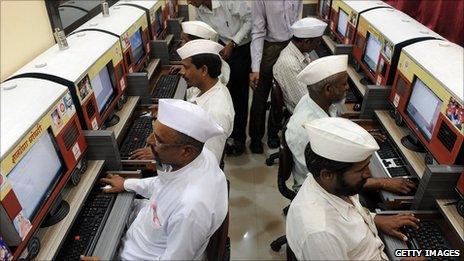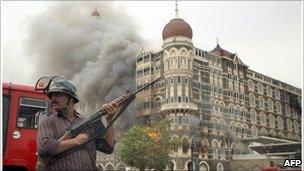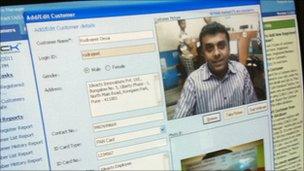Freedom fears of India's web users
- Published

Tough new internet rules in India have been met with a mixed reaction from web users and online businesses. Google has warned they could threaten online freedom. The government claims they will save lives.
"The internet is my lifeline. It's how I breathe," says Netra Parikh as she taps away furiously on her laptop.
Ms Parikh is a self confessed internet junkie, who claims to spend more than 18 hours a day online. Such is her passion for the micro-blogging site Twitter, that she has been named by some of her fellow social networkers as India's "Queen of Twitter".
But recently issued guidelines, designed to regulate what can and can't be posted online in India are a huge cause of concern for Netra.
"We voice our opinion through tweeting and all that, and if someone doesn't like it, does that mean we have to shut our mouth? Does that mean we can't speak anymore?"
Grossly harmful
Ms Parikh, and many other bloggers and tweeters are exercised about the Indian government's updated regulations on the internet, which require any comment considered objectionable be removed by the host site within 36 hours of it receiving a complaint.

Netra Parikh is known as India's Queen of Twitter
The definition of what should be taken down includes anything which is - "grossly harmful, harassing, blasphemous defamatory, obscene, pornographic, paedophilic, libellous, invasive of another's privacy, hateful, or racially, ethnically objectionable, disparaging, relating or encouraging money laundering or gambling, or otherwise unlawful in any manner whatever."
Anything which - "threatens the unity, integrity, defence, security or sovereignty of India, friendly relations with foreign states, or public order or causes incitement to the commission of any cognisable offence or prevents investigation of any offence or is insulting any other nation," must also be removed.
The rules for host websites form part of guidelines on the internet and update India's IT Act of 2000.
They have caused an outcry online; many bloggers and tweeters say the inclusion of terms such as "disparaging", "hateful" and "grossly harmful" are open to wide interpretation and could see any innocently disseminated comment being taken down for fear of causing offence.
"No-one has a say of what is right, and what is wrong... if someone objects you can't talk about it," says Nikhil Kumar Verma, who was recently named one of India's top ten most influential tweeters.
Mr Verma, who reviews food and music for his blog , is concerned the rules will stifle his ability to voice his views online, and that content will now have to be sanitised for fear of being taken down.
Hate speech
"A lot of people will be scared about saying anything now," he says. "If I write about the state of Mumbai's roads, for instance, and someone has an objection about what I say, and deems it hateful, does that mean I'll have to take it down?," he questions.
"During the Cairo revolution a lot of the information spread because of social media. Regulations like this could stop people talking about things on the internet just in case someone might object to it," he says.
The Indian government refutes any suggestion that these guidelines will restrict free speech, stressing that they are in accordance with international laws.
Google recently issued a statement responding to the rules. The internet company said: "We believe that a free and open Internet is essential for the growth of digital economy and safeguarding freedom of expression.
"If Internet platforms are held liable for third party content, it would lead to self-censorship and reduce the free flow of information.
"The regulatory framework should ideally help protect Internet platforms and people's abilities to access information."
The onus on host websites to remove objectionable content is a cause for concern to Mahesh Murthy who runs Pinstorm, a digital marketing agency in Mumbai which manages clients' online brand presence.

Authorities in India believe the rules will help prevent attacks like those in Mumbai in 2008
"Any individual can write to us and say that piece of content offends us and without any recourse we have to take it down," he says.
"This gives us an extremely onerous responsibility to be able to police every bit of content before it goes out," adds Mr Murthy.
Mr Murthy believes this added requirement to respond to complaints will slow down the growth of the internet in India, by placing more responsibility on companies.
But others believe the regulations are necessary to regulate the vast amount of content which is posted on social networking sites and other forums.
"Someone could write a blog, and if some things are defamatory the law provides a way for you to ask for protection, and for that information to be removed," says Akhilesh Tuteja, an internet analyst for KPMG.
Mr Tuteja says the laws are "not perfect" but believes they are "step in the right direction".
Cafe watch
India's online population is rising with more than 81 million people logging onto the internet. It is estimated 40 per cent of the country accesses the web via cyber cafes. The Indian IT ministry has also issued new regulations on how these store user information.
The guidelines require café owners to register with a central government agency. They also have to keep a record of the name, address, photo, and browsing history of visitors and submit this to a the agency .
"Cyber Café shall prepare a monthly report of the log register showing date-wise details on the usage of the computer resource and submit a hard and soft copy of the same to the person or agency as directed by the registration agency by the 5th day of next month," read the guidelines.
Such requirements are a necessary price to pay for national security, says Rudrajeet Desai from Clinck, a company which installs software to allow cyber cafes to store log details electronically.

Internet cafes must follow strict guidelines on recording user activity
"If a user sends an e-mail against the government or about an assassination it can be tracked back to the cyber cafe's computer. If at that point the owner has the photo it becomes extremely easy for the investigating authorities to track back the consumer," he says.
Mr Desai does not believe that this amounts to cyber cafes becoming an arm of the law, and says that the kind of information they are being asked to store is no different to that collected by other companies when someone buys a house, or shops with a supermarket loyalty card.
He explains that the majority of the 14,000 or so cafes he works with support the measures, which are in part designed to prevent people using them to plot attacks like the one in Mumbai in 2008.
"I do believe there is a certain bit of privacy which has been hampered but when you compare it with security against terrorism, I don't think it holds that much of an importance," he says.
A spokesman for the Indian government told the BBC he did not believe that freedom of speech has been restricted with the issuance of these guidelines, but campaigners say they'll continue to push for a change.
- Published17 May 2011
- Published19 May 2010